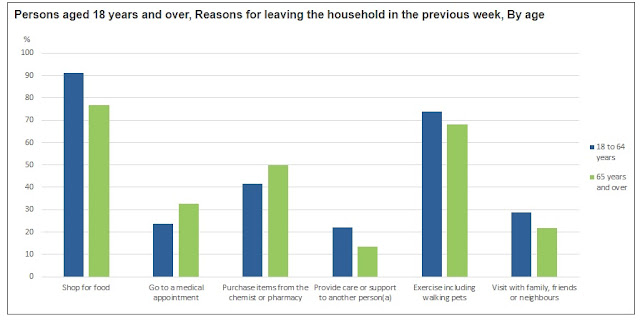According to the survey, almost 1 in 2 (46%) of respondents said the pandemic had resulted in them now working from home. For those not working from home, the almost universal reason (89%) was due to the nature of the work (ie unable to be done from home). Details on employment arrangements read more constructive in this survey in terms of holding a job (+0.6ppt to 64.2%) and paid hours worked (+2.4ppt to 59.0%), though the ABS notes there is a high margin of error attached to these estimates so making broader extrapolations on the state of the labour market on that basis would be unwise.
Precautionary behaviour by Australians remains evident, highlighted by adherence to social distancing (94%) and the avoidance of public spaces (85%). This then extends into the home where 65% of respondents said they were diligent in disinfecting surfaces before using them. Compared to a month earlier, adhering to social distancing was little changed, though there had been a notable decline in stockpiling of essentials as households work through their inventories (see below).
Source: ABS
This level of precaution becomes further evident when looking at the reasons respondents provided for getting out of the house. For both 18 to 64-year-olds (91%) and those aged 65 and over (77%) shopping for food was the main reason for their outing followed by exercise. There was a clear spread between these two purposes and all other reasons for outings (see below).
Source: ABS
So, the profile we have is a prevalence of working from home and precautionary behaviour in which outings are likely to have been limited to trips to the supermarket and for exercise. Linking this together, the survey then informs us that the feeling of loneliness has been common, more so for females (28%) than males (16%). Other stressors that this unfamiliar lifestyle has brought on include;
- difficulty in maintaining a healthy lifestyle (19%) with around 1 in 5 eating more junk food than usual, 3 in 5 engaged in more screen time and a little more than 1 in 10 (14%) had increased alcohol consumption
- problems managing existing health, mental health or chronic conditions (10%), with around 1 in 10 having had a health appointment cancelled
- relationship difficulties (7%)
Source: ABS
The survey then reports that 1 in 10 adult Australians has sought out advice during the crisis to help deal with some of the above or other issues such as employment or financial-related concerns. Overall, 12% of females had sought support compared to 8% for males. The most common form of support has come through a family member (71%), followed by a private or public organisation or service (such as Beyond Blue or Lifeline) (33%) and then a friend or work colleague (17%). For those that had sought out help 95% said they were able to obtain it either all or most of the time. However, there appears to be a particular issue here for Australians managing a mental health condition. With face to face appointments perhaps being avoided due to social distancing, more than 1 in 3 (33%) had turned to a Telehealth service for advice, which is much more prevalent than the 15% that had used such a service who were not dealing with a mental health condition.
Recent readings of consumer sentiment, either from the ANZ's weekly survey or the monthly Westpac-Melbourne Institute report, have pointed to sharp improvements off the lows from late March and early April, though it remains outright pessimistic overall. Today's ABS survey sheds light on some of the reasons why highlighting concerns around being isolated from friends and colleagues, reduced quality of lifestyle, and the need for support to help deal with these difficult times.



